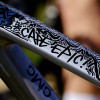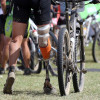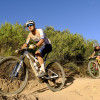How the 2025 Cape Epic was won – Nino Schurter reveals all

Just a few weeks ago, the male cross-country racing GOAT, Nino Schurter of the SCOTT-SRAM MTB Racing Team, joined forces with fellow Swiss pro teammate Filippo Colombo to win his third Absa Cape Epic overall title in South Africa.
- On and off the record with Nino Schurter
- Retrospective: the evolution of Nino Schurter’s cross-country race bikes
- Mountain Bike Icons – the Nino Schurter story
From there, he headed swiftly via Europe to Brazil to commence his UCI Mountain Bike World Cup campaign for the year, swapping marathon pairs racing weeks for weekend short-time intensity. Between the two Brazilian rounds of the series, we caught up with Nino to learn a little more about his winning approach to the Cape Epic.
off.road.cc: With the Cape Epic being the first major international mountain bike race of the year – and a multi-day endurance stage race, and then with you going almost straight into the UCI XCO World Cup, how do you balance training and preparation for such different demands?
Nino Schurter: We are not preparing specifically for the Cape Epic but are integrating the Cape Epic and its preparation into the build-up to the season. The Cape Epic is not the optimal preparation for the World Cup start in Brazil because there is too little recovery time between the Cape Epic and the World Cup start. But with this block, we have a good basis for the season.
ORCC: Going into Cape Epic, how rested and recovered, how on peak form or just under top form are you, and how do you balance that out to get timing right?
NS: I had a big block of three weeks in South Africa in February, then got back home to Switzerland to get well-rested. The weekend prior to Cape Epic, I chose an XCO race in Italy (which I won) to activate my system. Being well-rested going into the Cape Epic is key! Finding the balance and timing has a lot to do with experience, which I think I have now after all these years.
ORCC: How different is your bike and equipment strategy and set up compared to a regular XC race?
NS: Not much really. Gears are a bit lighter with a 36T instead of a 38- or 40T chainring, tyres with better protection, and obviously spare innertubes, plugs, CO2 cartridge, pump, and tools you don’t bring along to an XCO race.
ORCC: With the two-rider format and the differences in rider style, approach, mentality, and form, how do you balance that and get through together?
NS: To win the Cape Epic, you must be a united team. You only move as fast as the weaker rider, and often this changes during a stage or the eight days of riding. Acting as a team is key. It’s simple to say, but when the going gets tough, and you are at the limit partnership, either shines or fails.
ORCC: Before the race and individual stages, how much do you study the route and make potential race plans and strategies?
NS: We usually try to ride important stages a month prior during the SCOTT-SRAM training camp. With my 10 Cape Epics already, I also know the region around the Western Cape quite well. This helps to plan the race and make the right moves.
ORCC: How much does psychology come into play on the racetrack, both with you and your pattern, and against opponents?
NS: When the going gets tough, a big part of your performance is mental.
ORCC: When it comes to pacing strategies, looking at the overall picture, saving energy and using opportunities wisely – how do you balance that, and what has experience taught you here?
NS: Pacing is very important. You also have to know how to pace for eight days, which is very different from a one-day race. Knowing what you're capable of doing and not getting too excited in the first couple of stages is key in this process, which comes with experience.
ORCC: During the race, how flexible do you have to be with tactics and plans on the go – and how do you make tactical decisions and communicate them with each other as a team?
NS: The better you know each other, the less you have to communicate with your partner. We rarely have a fixed strategy going into the stage, and are always flexible. Every morning, you first have to feel how your legs are, and especially see how your competitors are doing. Most of the tactical moves happen spontaneously during the stages.
ORCC: What have been your key tactical mistakes and wins in the race over the years, and do you change strategy regularly?
NS: Each year, conditions, competition, the track, and my partners are different. You can’t be too fixed on strategy, and sometimes you only find out what works by making mistakes.
ORCC: What are the key factors that you would say make the difference between surviving the race and competing for regular riders?
NS: No matter if it’s a pro team or a couple of regular riders, it all comes down to being united and riding as a team. The closer you are as friends or in fitness levels, the better. If there is no harmony in the team, the weaker of the two is just surviving, and the better rider is also not racing. If you are united as a team, you can race, but often that’s not even the goal for regular teams. They’re often better enjoy than race for positions.
ORCC: Outside of nutrition, what are your key elements to daily recovery, and what is the routine?
NS: Ice bath, recovery boots, and then a next-level massage by our physio, Julia Hegar.

















